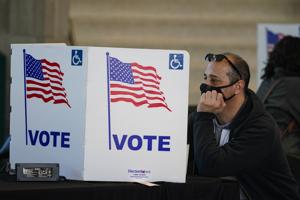Indiana Republicans give up on election reform, strip bill

(The Center Square) – What started as an attempt at election law reform in Indiana has been pared down to a single provision that would write into law something that is already being done – require voters give either a driver’s license number or the last four digits of their Social Security number when requesting an absentee ballot online.
Senate Bill 353, authored by Sen. Erin Houchin, R-Salem, originally required proof of citizenship to register to vote and required risk-limiting audits be done after every election – something that’s been recommended by election integrity experts for years but has never been done in Indiana, as a way to verify the number of votes tabulated by voting machines.
But both provisions were taken out at request of the Secretary of State’s office and the bill was changed to do four things: Prohibit the governor and the Indiana Election Commission from changing the time, place and manner of an election; prohibit the governor and commission from expanding absentee voting/voting by mail; require a voter give either a driver’s license number or the last four of a Social Security number to request an absentee ballot; and prohibit absentee ballot applications from being accepted with any information pre-printed on them.
But on Thursday, the chairman of the House elections committee, Rep. Timothy Wesco, R-Osceola, offered an amendment to take all of this out, and allowed a Democrat amendment offered by Rep. Tonya Pfaff, D-Terre Haute, to become the whole bill.
The bill now only requires someone requesting an absentee ballot online provide either a driver’s license number or the last four digits of their Social Security number, and would allow someone requesting an absentee ballot by mail to provide neither – using only a signature and signature-matching to verify the person’s identity.
“This bill now in its scaled-back form focuses only on the threat of security breaches that are inherent to the anonymous nature of the internet,” Wesco said in an e-mailed statement sent to The Center Square. “If requesting an absentee ballot online, this legislation would provide safeguards to ensure the person on the other end of the request is who they say they are, which should be standard practice for much of our internet activity.”
The language of the bill won’t change anything in practice, as the Indiana Secretary of State’s office already made changes to its online portal prior to the November election, to require anyone requesting an absentee ballot online to enter either a driver’s license number or the last four digits of their Social Security number.
And it now won’t stop the governor and the Indiana Election Commission from changing the date or time or place or manner of an election, or from expanding absentee voting or voting by mail.
Gov. Eric Holcomb issued an executive order last spring, moving the date of the state’s primary election from May to June because of COVID-19, and also ordered that no-excuse absentee voting be allowed. No-excuse absentee voting is not allowed under Indiana law. The law allows 11 reasons for voting absentee, including being out of the county on Election Day and having to work the entire time that polls are open.
In a hearing on SB 353 on Monday, Stephen Fry, the senior vice president for human resources and diversity at drug maker Eli Lilly and Company, testified in opposition to the bill, saying the company believes the bill is “a solution in search of a problem” and “serves only to confer acceptance of a widespread falsehood that there is something to be questioned about the outcome of last year’s election.”
He also said Eli Lilly opposes taking away from the governor, as the state’s top executive, the ability to change the date of an election in an emergency.
The amendment taking out language that referred to the governor and election commission was passed by a vote of 8-3, with four Republicans joining the four Democrats on the committee in voting Yes: Reps. Alan Morrison, Zach Payne, Craig Snow and Ann Vermillion.
The three Republicans voting No were: Reps. Timothy Wesco, Bob Cherry and Ethan Manning.
Disclaimer: This content is distributed by The Center Square

